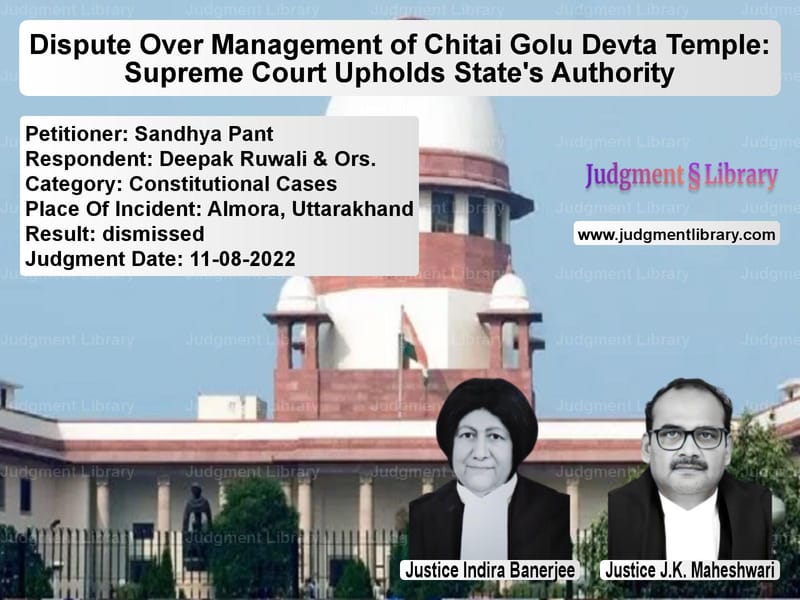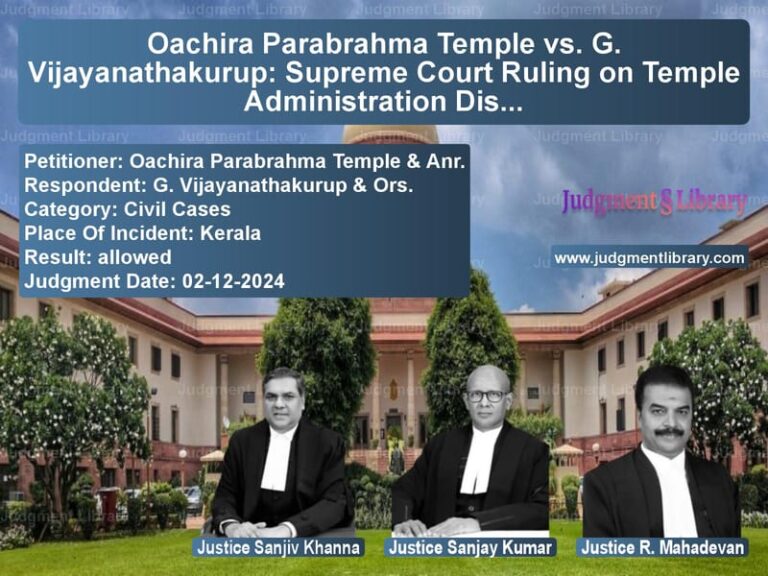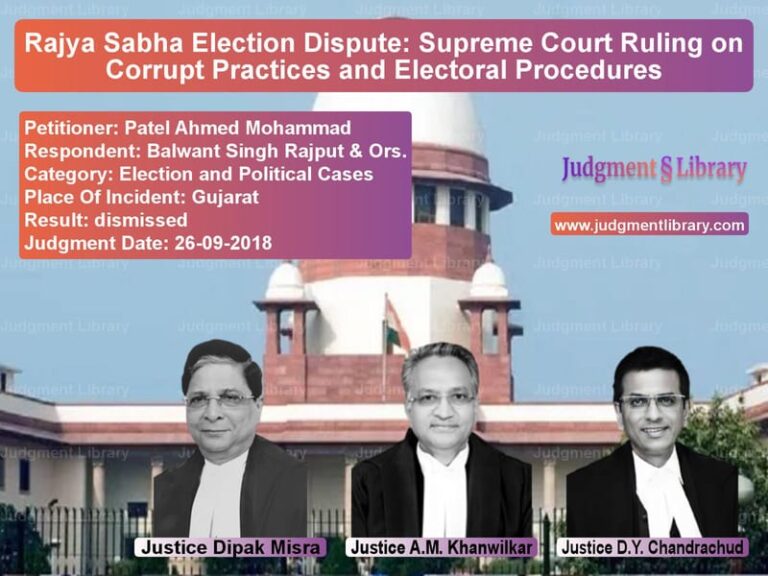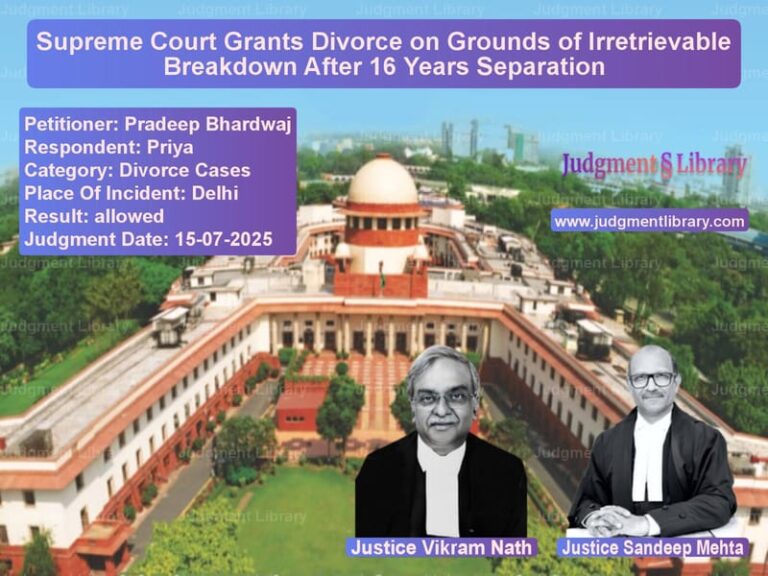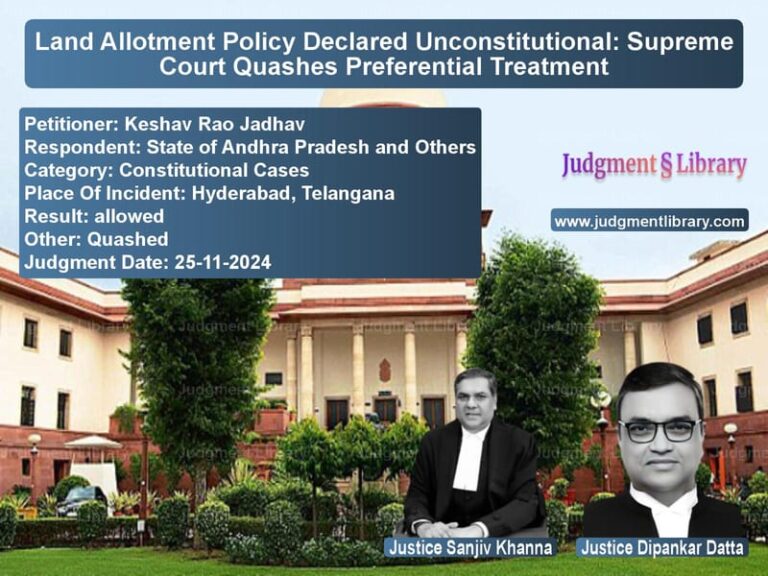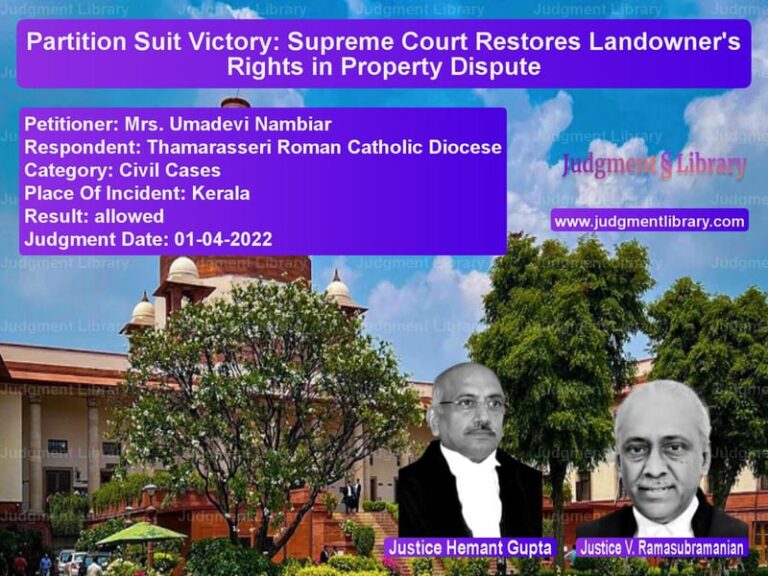Dispute Over Management of Chitai Golu Devta Temple: Supreme Court Upholds State’s Authority
The case of Sandhya Pant vs. Deepak Ruwali & Ors. revolved around a dispute concerning the management and administration of the Chitai Golu Devta Temple in Almora, Uttarakhand. The Supreme Court was tasked with determining whether the High Court erred in dismissing the appellant’s claim regarding the temple’s management without deciding her impleadment application.
Background of the Case
The dispute traces its origins to the administration of the Chitai Golu Devta Temple, which has long been managed by the Pant family. The appellant, Sandhya Pant, is the daughter-in-law of the late Chaturanan Pant, a descendant of the temple’s original founders. She claims that the temple has been privately managed by her family for generations.
However, a Public Interest Litigation (PIL) was filed by advocate Deepak Ruwali, seeking government intervention in the temple’s management. He urged the authorities to constitute a registered society or trust to oversee the temple’s administration. The Uttarakhand High Court, in response, directed the formation of an independent Managing Committee to handle the temple’s non-religious activities.
Challenging this decision, the appellant filed an application for impleadment in the High Court, asserting her family’s shebait rights. However, the High Court dismissed the PIL without addressing her application. Aggrieved, she approached the Supreme Court, arguing that her right to be heard was denied.
Key Legal Questions
The Supreme Court had to decide:
- Whether the High Court erred in disposing of the PIL without deciding the appellant’s impleadment application.
- Whether the State had the authority to regulate the temple’s non-religious affairs.
- Whether the appellant’s claim of shebait rights was valid under law.
Arguments Presented
Petitioner (Sandhya Pant) Arguments
- The appellant argued that the temple’s management had always been under her family’s control and that the State’s intervention was unwarranted.
- She claimed that the High Court’s failure to consider her impleadment application was a violation of natural justice.
- She asserted that the government’s involvement in religious institutions should be limited to non-religious matters and should not infringe upon hereditary shebait rights.
Respondent (State and Others) Arguments
- The State contended that the temple is a public religious institution, attracting thousands of devotees, and thus requires administrative oversight.
- It argued that the formation of an independent Managing Committee was necessary to prevent mismanagement and ensure transparency in handling donations.
- It cited legal precedents to assert that the government has the authority to regulate the secular aspects of a temple, even if the religious practices remain under traditional management.
Supreme Court’s Analysis and Judgment
The Supreme Court examined the appellant’s claims and the government’s authority to regulate temple management. The Court noted that the temple had evolved into a major religious institution, with a significant public interest in its administration.
Key Observations by the Supreme Court
- The Court held that the appellant’s impleadment application should have been considered by the High Court before disposing of the PIL.
- It ruled that the State has the right to regulate the temple’s non-religious affairs while allowing traditional custodians to continue religious practices.
- The Court emphasized that disputes over hereditary shebait rights should be adjudicated in a civil court, not through a PIL.
- It upheld the formation of the independent Managing Committee, stating that temple funds must be utilized for public welfare and temple upkeep.
Key Court Statement
“The management of a temple that attracts thousands of devotees cannot remain solely in the hands of private individuals. The State has a legitimate interest in ensuring transparency and preventing mismanagement.”
Final Judgment
- The Supreme Court upheld the Uttarakhand High Court’s decision.
- It ruled that the independent Managing Committee would continue to oversee the temple’s non-religious affairs.
- The appellant was granted the liberty to pursue her claim over shebait rights in a civil court.
- The appeal was dismissed.
Implications of the Judgment
This ruling has significant implications for temple administration in India:
- It reinforces the State’s authority to regulate public religious institutions while respecting hereditary religious practices.
- It clarifies that disputes over shebait rights must be settled through civil litigation, not PILs.
- It establishes a precedent for government intervention in temple management to ensure transparency and prevent financial mismanagement.
Conclusion
The Supreme Court’s decision in this case balances the rights of traditional temple custodians with the need for administrative oversight. By upholding the State’s role in managing non-religious affairs while allowing religious practices to continue under hereditary custodians, the ruling ensures that public faith in religious institutions remains intact. The judgment serves as an important precedent for similar disputes concerning temple management across the country.
Petitioner Name: Sandhya Pant.Respondent Name: Deepak Ruwali & Ors..Judgment By: Justice Indira Banerjee, Justice J.K. Maheshwari.Place Of Incident: Almora, Uttarakhand.Judgment Date: 11-08-2022.
Don’t miss out on the full details! Download the complete judgment in PDF format below and gain valuable insights instantly!
Download Judgment: sandhya-pant-vs-deepak-ruwali-&-ors.-supreme-court-of-india-judgment-dated-11-08-2022.pdf
Directly Download Judgment: Directly download this Judgment
See all petitions in Fundamental Rights
See all petitions in Public Interest Litigation
See all petitions in Legislative Powers
See all petitions in Judgment by Indira Banerjee
See all petitions in Judgment by J.K. Maheshwari
See all petitions in dismissed
See all petitions in supreme court of India judgments August 2022
See all petitions in 2022 judgments
See all posts in Constitutional Cases Category
See all allowed petitions in Constitutional Cases Category
See all Dismissed petitions in Constitutional Cases Category
See all partially allowed petitions in Constitutional Cases Category

